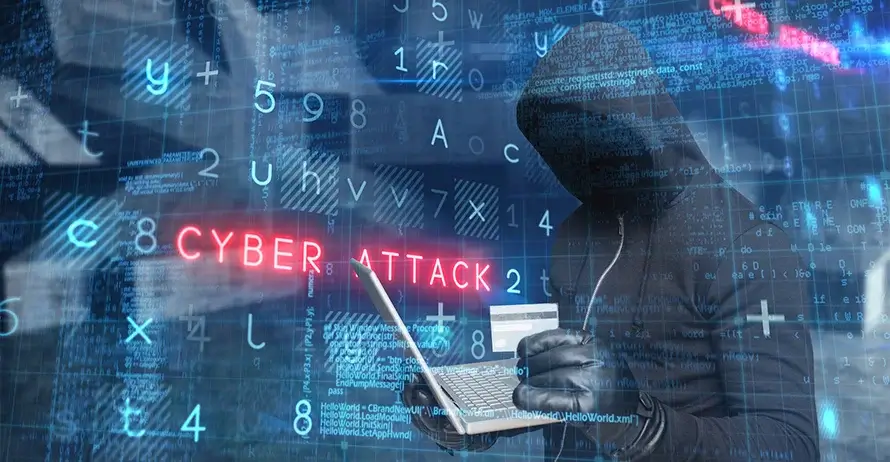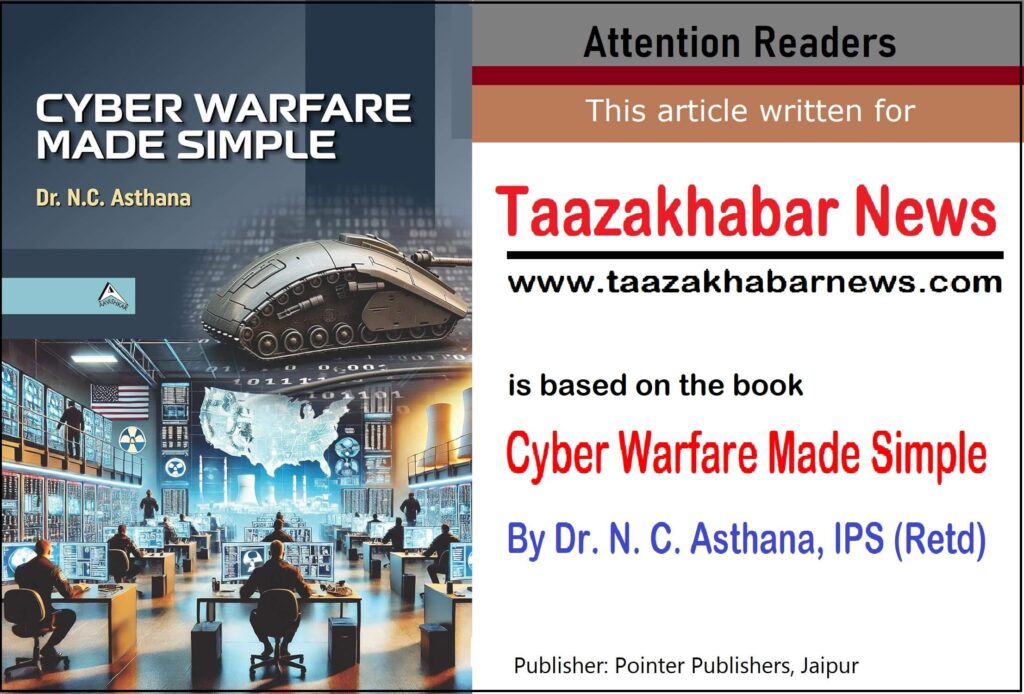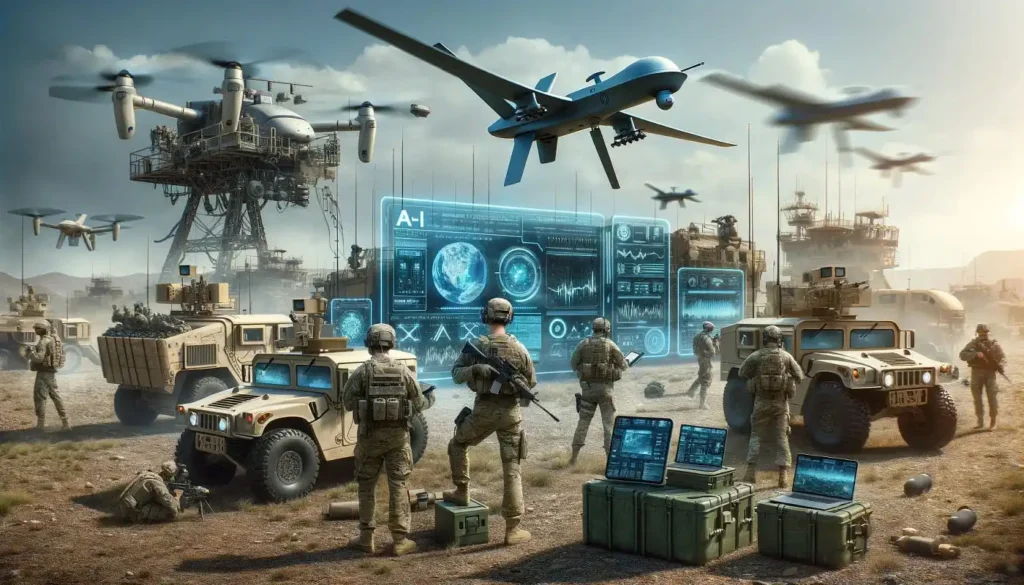Conventional warfare leads to destruction of critical assets; cyber warfare leads to widespread disruption in the functioning of critical assets, plants, factories, machinery and services, which hurts the country and the people more than what bombs could do. For example, the power plants will remain intact but will be unable to deliver electricity because power grids would fail; banks and ATMs will be intact but people will not be able to withdraw money.
A Prophetic Bluster by ‘Q’

In the James Bond film ‘Skyfall’ (2012), Bond, for a change, is surprised by a new ‘Q’, a young guy in place of the old, affable ‘Q’, the very epitome of a very professional-looking, wizened inventor, who had long been Bond’s friendly and patient support. ‘Q’ (for Quartermaster, a usage copied from the British army), like ‘M’ (the chief of the Secret Service), is a job title rather than a name. He is the head of the ‘Q Branch’, the research and development wing of the British Secret Service, responsible for developing and producing extremely advanced and hitherto unused top-secret technologies to equip Bond suitably for his dangerous missions in the field.
In ‘Skyfall’, the new ‘Q’ first meets James Bond at the National Gallery in London as the new ‘Q Branch’ had not yet finished setting up its lab. The young ‘Q’, with his dishevelled hair and wearing a parka, the very antithesis of what one would expect a scientist to look like, sits down beside Bond. He engages him in polite conversation about the painting Bond appears to be watching intently, ‘The Fighting Temeraire’ by British artist J. M. W. Turner. When asked what he discerned in the painting, Bond dismissively replied, “A bloody big ship”. As Bond, disinterested in further conversation, tries to excuse himself, the young man, without further ado, reveals that he is the new ‘Q’, much to Bond’s surprise and amusement. There was this witty, tit-for-tat conversation between the two.
Q: “007. (Bond is startled by the revelation of his identity in public by a stranger and sits back down.) I’m your new Quartermaster”.
James Bond: “You must be joking”.
Q: “Why, because I’m not wearing a lab coat?”
James Bond: “Because you still have spots”.
Q: “My complexion is hardly relevant”.
James Bond: “Your competence is”.
Q: “Age is no guarantee of efficiency”.
James Bond: “And youth is no guarantee of innovation”.
Q: “Well, I’ll hazard, I can do more damage on my laptop sitting in my pyjamas before my first cup of Earl Grey than you can do in a year in the field”.
James Bond: “Oh, so why do you need me?”
Q: “Every now and then a trigger has to be pulled”.
James Bond: “Or not pulled. It’s hard to know which in your pyjamas. Q”.
Q: “007”.
That was in 2012. Looking back, you will realize how prophetic the makers of the Bond film were as they have had been for myriad other things as well. Most of those technologies, invented exclusively for Bond to ‘save the world’, did materialize in future. The Bond film ‘You Only Live Twice’ was released in 1967 and the film showed vertically landing and reusable rockets, something that became a reality with the Falcon 9 rocket of the American private company SpaceX in 2015. ‘Goldfinger’ (1964) showed a car with GPS. ‘The Spy Who Loved Me’ (1977) featured a smartwatch capable of receiving messages. The list goes on and on.
‘Skyfall’ too was more than absolutely right with its allusion to cyber warfare, as boasted by the new ‘Q’, “I can do more damage on my laptop sitting in my pyjamas before my first cup of Earl Grey than you can do in a year in the field”. As if to prove Bond’s reel world right, it did indeed happen just five years later in the real world.
Cyber Warfare is no longer Science Fiction

For most people, cyber warfare is a mysterious and daunting subject. They are familiar with cybercrimes, but not with cyber warfare. Cybercrimes are well-known because they target people, businesses or organizations for money. However, in cyber warfare entire countries become victims and their critical infrastructure, military systems, or strategic assets are targeted. Cyber warfare is a reality and there have already been scores of instances of undeclared cyber warfare with great effect between nations. In tomorrow’s world, the most intense battles will be fought within computer networks with data and code, not with bullets or bombs. The world has already entered a ‘cyber-arms race’.

In 2010 itself, cyber warfare through ‘Stuxnet’ of USA and Israel quietly disrupted Iran’s nuclear machines and set their ambitious nuclear programme back by several years. Countries generally try to downplay the effect of cyber warfare because acknowledging that they had succumbed to an attack mounted by just a laptop shows how vulnerable they are and it triggers panic amongst the people. Iran officially admitted the damage by ‘Stuxnet’ only months later. That’s how most people have remained unfamiliar with cyber warfare. However, as we will narrate in the forthcoming articles, you will be amazed and enthralled by the accounts of a large number of cyber attacks that countries like Russia, China and North Korea have already mounted successfully in the past.
The most baffling aspect of cyber warfare is that the attacks originate from the anonymity of the Internet. By the time you figure out who is doing what to you, your critical infrastructure like airports, power grids, banking, etc. would have become dysfunctional.
Depending on the extent of anticipated disruption in the target country, cyber warfare could be an isolated military strategy in itself; or, it could serve as a supplementary form of aggression aimed at undermining and disorienting the adversary prior to a conventional military assault or along with it.
The most likely targets in cyber warfare would be:
- Military assets, organizations and weapon systems
- Communication infrastructures
- Financial markets and banking infrastructure
- Electrical power grids and power plants
- Other public infrastructure like dams
- Water and fuel distribution networks
- Safety systems like traffic management or early warning alerts
- Internet-connected services
- Emergency response systems
How the Virtual Hurts the Real

Cyber warfare has the potential to transform every computer or computerized device you own into a tool on a virtual battlefield, with repercussions that are felt in the real world. In cyber warfare there are not any bullets, bombs, explosions or destruction. In other words, there is no kinetic force used. Rather, there is primarily widespread disruption in the functioning of critical systems, plants, factories, machinery and services, which will hurt the country and the people more than what bombs could do. The power plants will generally not be blown apart but will be unable to deliver electricity because power grids would fail; banks and ATMs will be intact but you shall not be able to withdraw money. Cyber warfare can cripple economies by disrupting banking and payment systems or stock exchanges, leading to economic collapse or severe instability. This will result in long-term societal breakdown and even civil unrest.
Disruption of normal functioning will be followed by physical damage due to secondary consequences. For example, malfunctions introduced in the Industrial Control Systems (ICS) of factories or various processing plants could result in overheated machinery; explosions in pressure equipment; uncontrolled vibrations in machinery leading to mechanical failures; hazardous chemical leaks; overflows or other disasters, directly endangering human life. Cyber attack on a power grid could lead to blackouts. Without power, critical services like hospitals, traffic lights, and water supply systems would fail, leading to situations where emergency services are not able to respond effectively, or life-saving medical equipment stops working, endangering lives.
By cyber intrusion into and manipulation of air traffic control or railway systems, the enemy could manipulate flight paths or train signals, resulting in collisions or derailments. The 1997 film ‘Speed 2: Cruise Control’ had imagined exactly this. The villain, a former disgruntled employee of a cruise company, hacks into the computer system of a luxury cruise ship and programs the ship’s course so as to irreversibly crash into an oil tanker, which would sink both ships besides causing thousands of casualties.
Cyber Espionage

Cyber espionage involves the covert penetration of other nations’ computer systems to steal confidential information. That is not limited to defence matters alone. The advanced industries of a nation, for example, are not merely profit-making ventures for capitalists. Their trade secrets are vital for the technological superiority of that nation. If design secrets are leaked out to enemy countries, the nation will lose its technological edge. Traditional forms of espionage, such as human intelligence, are both dangerous and cost intensive. That’s where cyber espionage scores. You steal information from the computer systems of the enemy while sitting in your country.
How Cyber Warfare is waged?

In modern life almost everything that we do, whether it is communications through emails, social media, and messaging apps; online shopping and banking; entertainment through streaming services like Netflix or YouTube; or online courses, it is dependent upon computers or digital systems. Businesses depend on digital networks for everything from supply chain management to customer relations. Computers, digital systems, computer networks, and the Internet are integral to the functioning of critical systems and national organizations also. Defence systems rely heavily on computer networks for communication, intelligence, and operation of surveillance and weapon systems. Electrical power grids, transportation systems, and water supply networks are all managed through sophisticated digital control systems.
While these technologies have made the lives of people more convenient and the functioning of the society more efficient, they have also introduced complexities. Any disruption in the functioning of the computers or the connectivity, and there will be serious disruption in the tempo of life. This is exactly what cyber warfare targets.
How it becomes feasible for someone sitting thousands of miles away to steal sensitive data from top-secret organizations or disrupt factories and plants in another country? It becomes feasible because the moment you connect your computer to the Internet, you are potentially ‘exposed’ to and are ‘networked’ with millions of hackers on the Net. It is like horror films; you are not alone in the room! Like ghosts, there are unseen, unknown people present on the Net, which could do very bad things to your country ‘through your computer’ before you realize what happened. They can use your computer to attack other computers and you will remain unaware of it. That malicious, silent use of networks, ladies and gentlemen, forms the basis of cyber warfare.
How it is actually done? Cyber warfare demands extremely high level of expertise in computers, hacking and cybersecurity, besides state-of-the-art technology that they have to develop themselves. With billions of people using computers every day, it is imperative that they must understand how, even without declaring a war, hostile nations can take control of their devices and use them to launch devastating attacks on their countries.
The interconnectedness of global corporations, the complexity of the job of continued cybersecurity, and the vast attack surfaces make it very difficult to defend against cyber warfare. Then, from its very nature, cyber warfare makes attribution very difficult. By the time you may pin blame on someone, it would be too late.
Why India must be worried?

Indians must be worried about cyber warfare because India faces a significant number of cyber attacks from hostile countries. While the exact number of cyber attacks on India’s sensitive systems is classified, in October 2019, the Nuclear Power Corporation of India Ltd. (NPCIL) had acknowledged that they had detected and thwarted a cyber attack on the country’s nuclear power plant in Kudankulam, Tamil Nadu. In May 2024, BlackBerry Blog published a report titled ‘Transparent Tribe Targets Indian Government, Defense, and Aerospace Sectors Leveraging Cross-Platform Programming Languages’ about the Pakistani hacker group Transparent Tribe’s cyber attack. These would give readers some idea of the way India is being targeted.
Many nations of the world including India have lulled themselves into a complacent slumber presuming that their geographical distance from warring nations, their professed political neutrality or non-involvement in military efforts or economies of either country would automatically protect them. Fact is, you could very well become an unintended victim, if not intended because a cyber weapon, once unleashed is both uncontrollable and unpredictable. Cyber warfare is truly global warfare. Effectively, the enemy is already at the gates.

